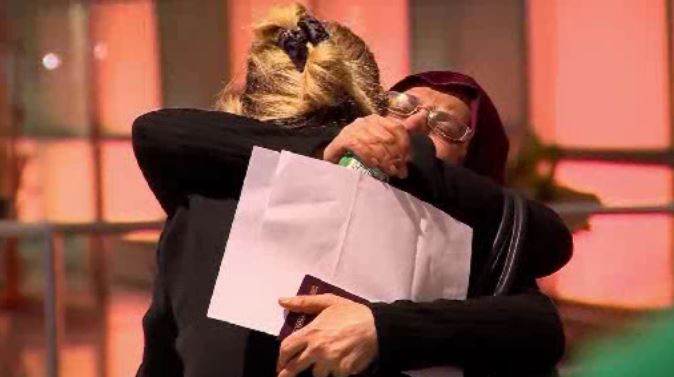BOSTON (AP) — Travelers from the seven predominantly Muslim countries targeted by President Donald Trump enjoyed tearful reunions with loved ones in the U.S. on Sunday after a federal judge swept the ban aside.
Airlines around the world allowed people to board flights as usual to the United States.áOne lawyer waiting at New York’s Kennedy Airport said visa and green-card holders from Iraq and Iran were encountering no problems as they arrived.
“It’s business as usual,” said Camille Mackler, of the New York Immigration Coalition.
Fariba Tajrostami, a 32-year-old painter from Iran, came through the gate at Kennedy with a huge smile and tears in her eyes as her brothers greeted her with joyful hugs.
“I’m very happy. I haven’t seen my brothers for nine years,” she said.
Tajrostami had tried to fly to the U.S. from Turkey over a week ago but was turned away.
“I was crying and was so disappointed,” she said. “Everything I had in mind, what I was going to do, I was so disappointed about everything. I thought it was all over.”
Tajrostami said she hopes to study art in the U.S. and plans to join her husband in Dallas soon. He moved from Iran six months ago, has a green card and is working at a car dealership.
Similar scenes played out across the U.S. two days after a federal judge in Seattle suspended the president’s travel ban and just hours after a federal appeals court denied the Trump administration’s request to set aside the ruling.
The U.S. canceled the visas of up to 60,000 foreigners in the week after the ban on travel from Syria, Iraq, Iran, Sudan, Somalia, Libya and Yemen took effect, according to the State Department. Trump also suspended nearly all refugee admissions for 120 days and barred Syrian refugees indefinitely.
The order triggered protests and a multitude of legal challenges around the country and blocked numerous college students, researchers and others from entering the U.S.
Trump, who said the goal was to keep terrorists from slipping into the country, lashed out against U.S. District Judge James Robart for putting the ban on hold. He referred to Robart as a “so-called judge” and called the ruling “ridiculous.”
On Sunday, the president tweeted: “Just cannot believe a judge would put our country in such peril. If something happens blame him and court system. People pouring in. Bad!”
Mahsa Azabadi, 29, an Iranian-American who lives in Denver, was forced to put her wedding plans on hold after her fiance, Sorena Behzadfar, was turned away when he tried to board a plane to travel from Iran to the U.S. on Jan. 28.
Over the weekend, though, Behzadfar was cleared for travel and was expected to arrive at Boston’s Logan Airport on Sunday afternoon.
“It’s been a really tough week to figure out what will happen to us,” said Azabadi, who has lived in the U.S. for 11 years and is now a U.S. citizen.
The couple are hoping to keep their wedding date of May 12.
“Seeing the support from the lawyers and different people trying to help, it was really nice,” she said. “We want to be the best and do the best for the people and for this country. We would love to have the opportunity.”
Iranian researcher Nima Enayati, a Ph.D. candidate at a university in Milan, was prevented from boarding a flight to the U.S. on Jan. 30. He had a visa to conduct research on robotic surgery at Stanford University in California.
On Sunday, he said, his check-in went smoothly, and he was on his way to New York, where he was expected to arrive in the evening.
At Cairo Airport on Sunday, officials said a total of 33 U.S.-bound migrants from Yemen, Syria and Iraq boarded flights.
Lebanon’s National News Agency said airlines operating out of Beirut also began allowing Syrian families and others affected by the ban to fly. Beirut has no direct flights to the U.S.; travelers have to go through Europe.
At Kennedy, a team of volunteer lawyers that had set up operations in a diner to help arriving passengers during the height of the crisis packed up computer equipment and paperwork. A few volunteers and interpreters will stay behind just in case.
One interpreter, Fifi Youssef, stood with a sign in Arabic at the arrivals area but said she hadn’t been asked to help anyone all day.
“I’m glad. That means no people are getting detained,” she said.
Mackler, who has helped coordinate the volunteer operation, liked what she saw at the airport.
“This is what it should be. You sit in an airport day in and day out, and you see all these moments of great joy and unification,” she said. “It was so sad to see that and know some people weren’t having that. Now it feels good.”
Copyright 2024 The Associated Press. All rights reserved. This material may not be published, broadcast, rewritten or redistributed.

